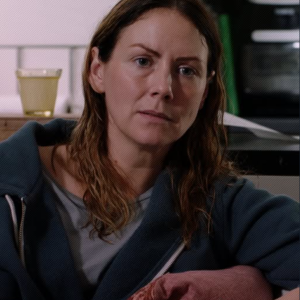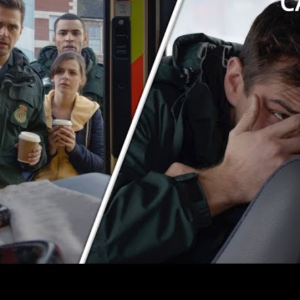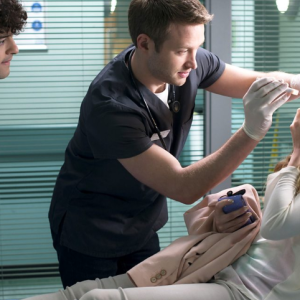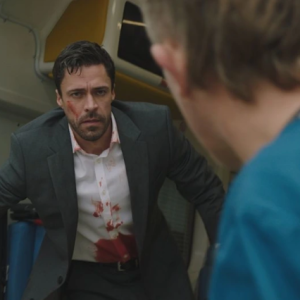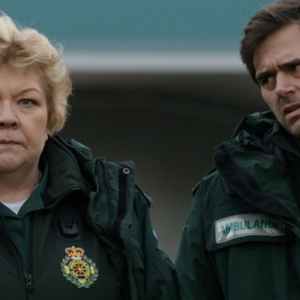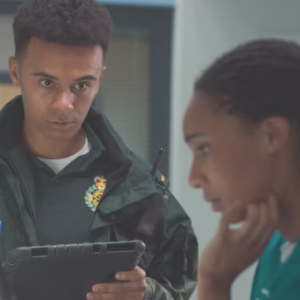The streets outside Holby were lit with flashing blue lights when a late-night police pursuit spiraled into disaster, exposing not only broken bodies but a broken officer at the center of the chaos. What began with sirens and a suspect in custody ended with a police vehicle ploughing into two young women crossing the road, their screams echoing as metal crumpled and brakes screeched too late. Officer Mike Daniels, already groaning with pain, was dragged from the wreckage by his colleague Owen who insisted he was driving, though the truth hung heavy in the air like the smell of petrol and stale vodka. The paramedics arrived to find fractured bones, bruised faces, and a young woman named Ella swaying on her feet, insisting she was fine though alcohol clouded her eyes. Behind the quick patchwork of first aid and immobilization boards lay an unspoken question: how did a serving policeman end up in a squad car that smelled more of liquor than gasoline? That answer came not in reports or investigations but in the raw confessions that tumbled out under hospital lights.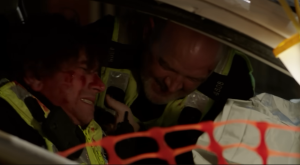
As the team worked frantically, Ella revealed she was only nineteen, staggering home after too many drinks, while her so-called friend admitted the two had been together for work at a nightclub. It might have been just another tragic collision between reckless youth and speeding authority, but whispers around the stretcher told a different story. “Mate, you still stink of booze,” one officer muttered to Mike, his voice thick with both accusation and disbelief. Owen tried to shoulder the blame, tried to insist he had been behind the wheel, but his story cracked under pressure, and the truth seeped out through clenched teeth and bloodied uniforms. This was not a one-off lapse, not the unlucky twist of fate that sometimes shatters lives on the road. This was a man who had been drinking for far longer than anyone wanted to admit, a man who had been hiding a spiral of addiction behind the badge and the bravado. His fracture was not only in his tibia and fibula, splintered and displaced, but in the very core of his professional life.
The drama intensified when evidence from the car revealed more than twisted metal. A bag was recovered, claimed by Mike, dismissed as a mistake, but quickly turning into a symbol of the larger lie. His colleague confronted him, voice low and shaking, demanding honesty: “Don’t tell me you didn’t know. All that jokey banter — Mike’s been on another big night out!” And then came the confession that silenced the room. “I can’t sleep at night unless I’ve downed half a litre of vodka. I can’t function during the day unless I top up.” These words were not excuses but revelations, peeling back the carefully constructed façade of a policeman known as a hero, a protector, a figure of authority. The irony was brutal: a man sworn to protect lives on the road had instead endangered them with his own weakness, dragging not only himself but his colleagues toward ruin. He admitted he had hit rock bottom, that tonight was the moment his secret could no longer be hidden. Yet even in confession, the damage was irreparable, the consequences unavoidable.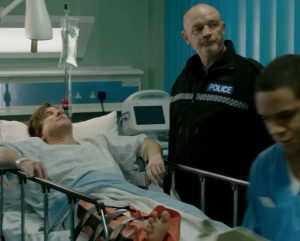
The young women caught in the path of the patrol car were lucky to be alive, their injuries minor compared to the carnage that might have been. But for Mike, luck had already run out. In a world where justice demands accountability, he was staring down the abyss of prosecution, suspension, and disgrace. His fractured bones might heal with surgery, but the fractures in his career and his reputation were beyond any doctor’s skill. Owen, torn between loyalty to a friend and the weight of duty, tried to shield him, but his words rang hollow in the face of the truth. “If you don’t hold your nerve, both of us are going down,” Owen warned, but even as he spoke he knew that the collapse was already underway. Cover-ups and lies could not erase the smell of alcohol on Mike’s breath, nor the testimony of those who had been inches from death beneath his wheels. What lingered in the hospital corridors was the bitter realization that the uniform does not make a man infallible, and that sometimes those entrusted with the highest responsibility are the ones least able to bear it.
In the end, the sirens faded but the fallout remained. A police force that prided itself on discipline was now forced to confront the rot within, and a man once hailed as a poster boy found himself unmasked as an addict, broken in body and spirit. His daughter’s frightened eyes told the story better than any investigation ever could — the disappointment, the betrayal, the fear of losing not only a father but the image of strength he had once projected. For the victims, the night would be remembered as a brush with death, an accident that could so easily have been a funeral. For Mike, it was the night rock bottom stopped being an abstract phrase and became a concrete reality, marked by handcuffs instead of commendations, hospital sheets instead of duty rosters. And for the public, it was a reminder that behind the flashing lights and uniforms are flawed human beings, capable of mistakes so devastating they ripple through lives and families like shockwaves. The tragedy of Holby’s drunken policeman was not only the crash itself, but the revelation of a man who had been slowly colliding with disaster long before the road claimed him.
